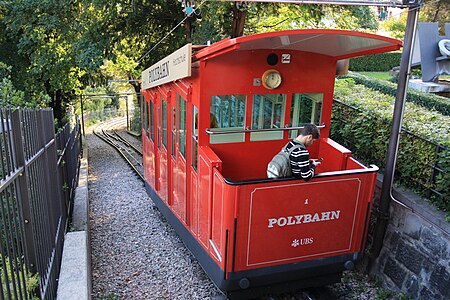Polybahn

The Polybahn, also known as the UBS Polybahn, is a funicular railway in the city of Zürich, Switzerland. The line links the Central square with the terrace by the main building of ETH Zürich, which was formerly called Eidgenössisches Polytechnikum, and from which the railway derives its name. Previous names for the line include the SBG Polybahn and the Zürichbergbahn. The line is owned by the banking group UBS AG, and operated on their behalf by the municipal transport operator Verkehrsbetriebe Zürich.The Polybahn is one of two funiculars within the city of Zürich, the other being the Rigiblick funicular in the city's northern suburbs. Additionally, the city's Dolderbahn rack railway was originally a funicular, until its conversion to rack working in the 1970s.
Excerpt from the Wikipedia article Polybahn (License: CC BY-SA 3.0, Authors, Images).Geographical coordinates (GPS)
| Latitude | Longitude |
|---|---|
| N 47.376388888889 ° | E 8.5438888888889 ° |







